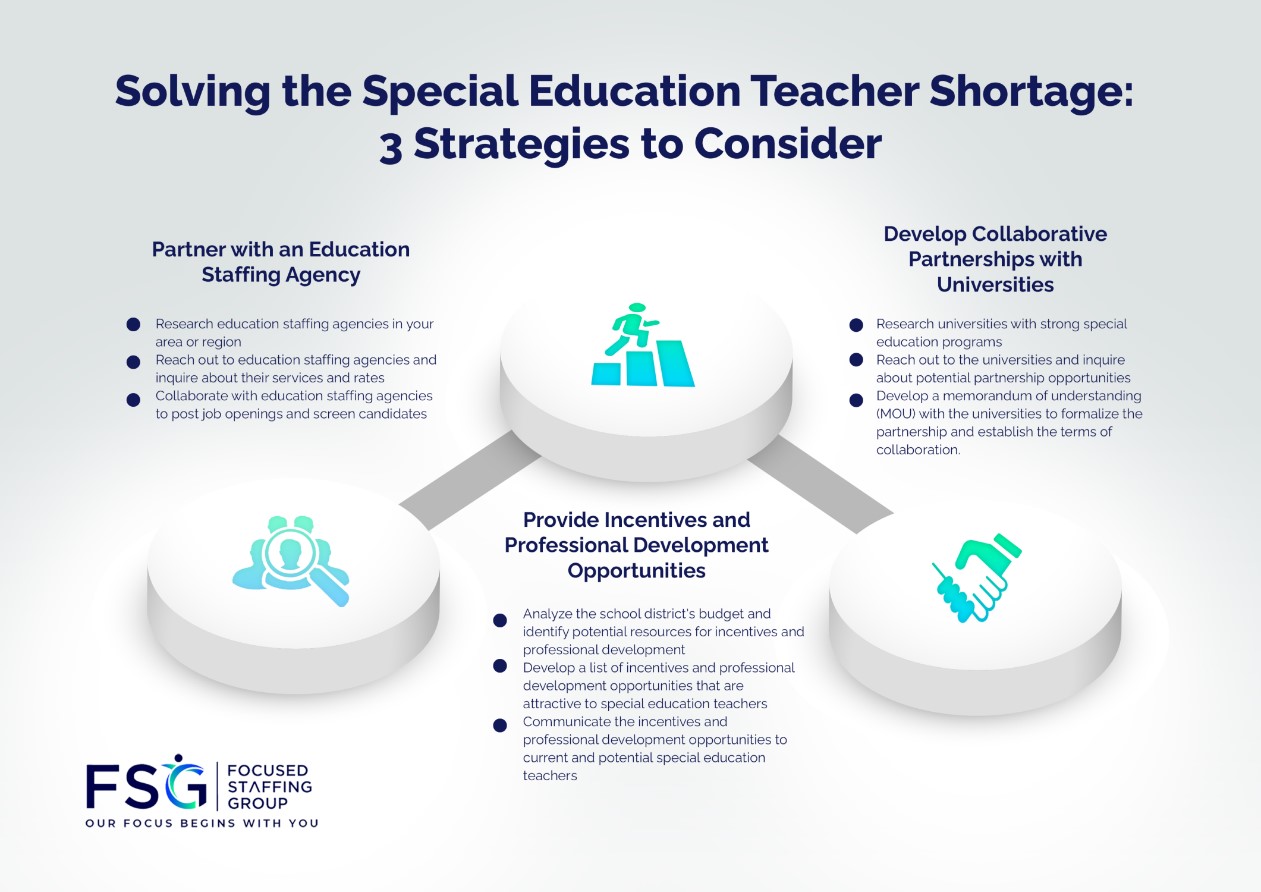
Research reveals that 45% of the schools in the United States have staffing issues with 7% of the vacancies being in the special education sector.
As schools adopt inclusive methods, the majority of kids with disabilities are now taught in general education classes. These inclusive strategies are altering the fundamental dynamics of the general education classroom. The trend toward team or co-teaching and the ongoing shortage of special education instructors affect how districts handle special education as well.
The distinctions between special education and general education classroom methodology, diagnosis, and instruction are becoming hazier which has been creating an alarming situation. Let's examine more closely a few of the top five concerns that are now gaining traction in the field of special education.
Issues That Are Currently Trending In The Special Education Sector

Here are a few issues that special education must consider and pay immediate attention to:
1. Technology
Particularly targeted for further help are kids with Individualized Education Programs (IEPs), as technology continues to significantly transform the classroom. Through the use of technology, instructors may improve their classroom education by providing individual learning opportunities. This gives them more freedom to differentiate their instruction using blended learning possibilities and a range of Web-based, evidence-based approaches.
Students are no longer forced to learn at a speed they are unable to keep up with or in a classroom they do not comprehend. Many children, especially those with the most severe developmental delays, find that the world is much more accessible thanks to devices that aid with communication, socializing, sensory concerns, and mobility challenges. While keeping up with the rapid speed of change might be difficult for educators, kids can benefit greatly from it.
Do you follow us on Social Media? We regularly share upgraded educational content, tips, feedback, and more. Check us out by clicking the profiles here - Facebook / Twitter / LinkedIn / Pinterest / Instagram / YouTube
2. Trauma-Informed Teaching
Every student uniquely responds to tragedy. There is no definitive list of cues to look for, but there are plenty of materials out there that outline potential trauma symptoms to watch out for. These pupils' problems affect learning even when they are outside of the classroom. Although each student's coping style is different, they do not automatically qualify for special education services.
Teachers can use trauma-screening tools to assist providers in determining the needs of children and families. The first step in managing a general education classroom with these exceptional learners is understanding the indications and available resources. Traumatized students undoubtedly need certain adjustments. Forces outside their control have a big influence on their surroundings and their work.
3. Twice Exceptional Students
Providing a curriculum that is suitable in both subject and grade level for every kid is one of the issues teachers confront, on top of everything else they have on their plates. When talking about pupils with special needs, age- and skill-appropriate curriculum is frequently mentioned. Examining a different student group with an eye toward their unique requirements is necessary.
These kids frequently become lost, and as a result of their gifts, they frequently end themselves hiding among the "average" people. Astute educators are now discovering how to provide these kids access to the same chances as talented children, help them study in ways that emphasize their talents, and simultaneously help them overcome their obstacles.
4. Parental Support
Being a member of a single, cohesive team that provides the greatest possible assistance for students is crucial right from the start. It's crucial to keep in mind that both you and the parents of your pupils ultimately want what's best for the kids. You have a significant influence on kids' lives, so make sure your voice is heard while also paying attention to what parents have to say.
Consider what's best for the children. Recall that although you are their champion, they are the parents. Make a strategy that works for everyone, a plan that meets kids where they are. More laws are in place to support special needs pupils in regular education classes. In both testing and instruction, students with special needs are included in the general populations of their grade levels.
5. Inclusivity
This is not so much a new trend as it is a recurring one. When is it appropriate for kids with special needs and learning difficulties to leave their classrooms and when is it appropriate for them to join regular education classes? How can we strike a compromise between our desire for diversity and its advantages and their unique, occasionally complex needs? It's a persistent query that frequently depends on the particular parties concerned.
In recent years, individualized learning strategies have grown in popularity. They represent an understanding that each kid has unique requirements, enabling help to be customized to meet those needs. This might sometimes offer opportunities for more education, employment, or independent living. Additionally, efforts are being made to provide students a voice and some degree of control over decisions about their personal lives by allowing them to participate more actively in the creation of these plans.
Next Step For Special Educators
An increasing number of kids are dealing with issues that fall beyond the purview of the Individuals with Disabilities Education Act (IDEA) or have been diagnosed with them. Teachers in general education are under a lot of pressure because of this. For these instructors, flexibility, specialized instruction, and continuing education are critical.
There might not be enough teachers with Special Education courses certification present, or they might be dispersed over many classrooms. The trick is to communicate. Collaborate with educators, parents, and students to establish a shared practice and achievement atmosphere. Recognize that your kids are traveling a path that may have unspoken obstacles.
We believe education should be accessible for everyone. That’s why we don’t charge for our blogs. Find the right course that will help you in your career with us, contact us at - 91-6292150868. You can mail us at act@asiancollegeofteachers.com
Get In Touch
UK – Registered OfficeAsian College Of Teachers Ltd (UK)
27, Old Gloucester Street, London – WC1N 3AX, UK
UK Toll Free: 0-808-189-1203
www.asiancollegeofteachers.co.uk
All SEN Courses are designed, developed and created by Asian College of Teachers Ltd, United Kingdom. These courses are certified by CPD Certification Service UK and endorsed by NCC Education, UK, and Short Courses from CACHE, UK through Laser Learning UK.
Asian College of Teachers (ACT) undertakes a continuous review of its teacher training courses to ensure imparting high quality education. However, there might be circumstances outside of ACT’s control which might affect its stakeholders like if you are planning to teach in a different country, applying for a teaching license, pursuing higher studies or trying to get the certificate approved by the Ministry of Education (MoE) of a particular country then you can do so with the certificate issued by Asian College of Teachers (ACT). However, each country’s Ministry of Education (MoE) or educational bodies set certain standards that are indispensable for the pursuit of higher studies or teaching in schools in that country. So it can be a possibility that you may be able to use the certificate for higher studies or teaching purposes in one country and not in another. Therefore, we strongly recommend that you investigate thoroughly and check with the relevant authorities regarding the acceptance of the certificate issued by us before you enrol on a particular course. ACT strives to offer high-quality education and its certificates can be valuable for various purposes internationally, but still it is crucial for individuals to verify the specific recognition of the certificate in the country they intend to use it, especially for formal education or professional licensing purposes. This approach ensures that the stakeholders make informed decisions regarding their educational and career paths.
© 2026 Asian College of Teachers. All Rights Reserved. Asian College Of Teachers is a trading brand of TTA Training Pvt. Ltd (India) - CIN U80902WB2016PTC215839, Asia Teachers Training Co., Ltd (Thailand) - Registration No. 0105558193360, Asian College Of Teachers Ltd (UK) - Company Number 9939942 & Asian College Of Teachers LLC, (USA) - Federal Tax Identification Number 30-1261596
Designed by kreativewebtech